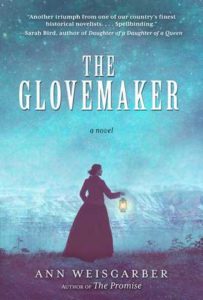 Review
Review
Title: The Glovemaker
Author: Ann Weisgarber
Publisher: Skyhorse Publishing
Genre: Fiction
Year of Publication: 2019
Number of Pages: 296
Binding: Hardcover
ISBN13: 978-1-5107-3783-9
Price: $24.99
Reviewed by Julie J. Nichols for the Association for Mormon Letters, March 4, 2018
It’s almost too simple. Most sentences are short. The tension begins on the first page and never lets up, but never overwhelms. The premise is not complicated, the suspense clear from that first page, the story compressed into three days and a month of recovery, a story that builds and shatters a world: Deborah’s wheelwright husband Sam is missing. He should have been home weeks ago from his yearly journey south to fix wheels before the winter sets in. Deborah doesn’t know where he is. But their habit has been to take care of the polygamous fugitives who often ride through Junction toward sanctuary in nearby Floral Ranch during the warmer months, so when one knocks on her door in early January, she knows both that she must help him and that something is wrong. The fugitives don’t flee in the cold. Why is he here? What should she do? How will her actions impact the eight families who came here to escape the reach of the all-too-insistent Latter-day Saint leaders back in Cedar City? Will her husband come home to help her?
The pace of this novel is slow but steady, insistent, beating more and more intensely as the pages turn. Sections are narrated by Deborah and by her neighbor and stepbrother-in-law, Nels. Three letters from Sam characterize him concisely as imaginative, caring, competent. We see something of their childless life in Junction. We understand why she loves him, and why she acts as she does.
History, Ann Weisgarber has discovered, shows that Junction—now Fruita, in Capitol Reef National Park—was settled by just such people, people for whom the Church had become a source of doubt and dishonor, largely because of the Mountain Meadows Massacre thirty years before the incidents in this novel. But the church was not an enemy—these were neither apostates nor hostile gentiles They simply needed space. They developed routes, and routines, for safe passage and apartness from the constriction of church governance. Their aid to the polygamous fugitives they kept a tight secret.
But that isolated life in rural southern Utah in 1888 was not easy or safe. High mountain passes, deep snow, unstable geography posed threats as dangerous as hostile gentiles. Deborah’s peril is physical, legal, and emotional. In the unfolding of her story, Weisgarber shows how that small corner of Mormondom made its way in the face of obstacles both without their city walls, and within.
The setting is severely limited. The characters are few. The conflict is tight-woven and easy to follow. But you come to like Deborah very much, to hope for her, to be uneasy when the plot thickens and full of grief when it breaks. More than one person dies in this novel, and more than one heart is broken. The ending isn’t that everyone lives happily ever after, and the language is no more eloquent than the people who speak it. But it’s a very good read—affecting, honest, authentic. Nothing stopped me—not the one or two small moments when I thought, “Oh, Weisgarber isn’t a member, or she wouldn’t have said it that way,” not the simplicity of the writing, not the slow but steady pace. You will want to read it to the end, and you won’t be able to skip anything. Not one word.
Skyhorse Publishing is an imprint of one of the fastest-growing independent publishers in the United States. Its website proudly announces that it is “dedicated to publishing books that make people’s lives better, whether that means teaching them a hobby, bringing them a unique and important story, or encouraging them to fight against injustices, conspiracies, or abuses of power. The company maintains a firm stance against censorship and aims to provide a full spectrum of political, theological, cultural, and philosophical viewpoints to counter the increasingly biased environment in mainstream media” (see https://www.skyhorsepublishing.com/about/). I include this information for two reasons.
First, The Glovemaker does make your life better. It’s a good read—every good read makes my life better!—and more–it’s a re-creation of a critical, and real, sector of early Mormonism, well-researched and very well depicted.
But it also is thrilling to know that a fine independent publisher not directly connected to the church or any group in or out of it welcomes such manuscripts, wherever they come from. The Mountain Meadows Massacre is a dark blot in our history. Some of our forebears closed their minds and mouths about it, but some left the church, while others, mourning that their beloved church should have such a blot, nevertheless stayed, heavy-hearted. We need to know this. We need fascinated historians to tell the stories, and we need publishers to spread the word. The Glovemaker is a gift for Mormons and non-Mormons alike, for all readers of historical fiction interested in the background of the beautiful, unique state of Utah. Read it and be enlarged.
